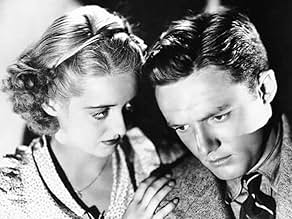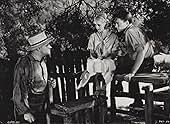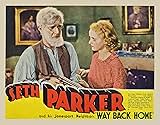अपनी भाषा में प्लॉट जोड़ेंSeth Parker takes in Robbie Turner and protects him from his cruel father Rufe. When the father disappears, Seth intends to raise Robbie as his own son. The vindictive father attacks Mary Lu... सभी पढ़ेंSeth Parker takes in Robbie Turner and protects him from his cruel father Rufe. When the father disappears, Seth intends to raise Robbie as his own son. The vindictive father attacks Mary Lucy, a neighbor's daughter who is also trying to help Robbie. Mary's boyfriend David rescue... सभी पढ़ेंSeth Parker takes in Robbie Turner and protects him from his cruel father Rufe. When the father disappears, Seth intends to raise Robbie as his own son. The vindictive father attacks Mary Lucy, a neighbor's daughter who is also trying to help Robbie. Mary's boyfriend David rescues her, and Rufe runs off with his son. But not for long.
- Seth Parker
- (as Phillips H. Lord)
- Mother Parker
- (as Effie L. Palmer)
- Income Tax Man
- (बिना क्रेडिट के)
- Station Master
- (बिना क्रेडिट के)
फ़ीचर्ड समीक्षाएं
What it does do very well is to depict a rural American life that is long gone--listening in on the party line, sharing preserves with the neighbors, a taffy pull, and especially singing. The folks all gather at the preacher's house to sing the traditional American standards of the day, accompanied by the preacher's wife on a pump organ: "Love's Old Sweet Song," "Put On Your Old Grey Bonnet," "Seeing Nellie Home," and the like. I imagine these are mostly forgotten today, and it's nice to see them preserved in a relatively realistic context such as this. An unexpected pleasure.
Seth Parker was a popular radio show at the time, the creation of 29 year old Phillips Lord, who plays him in the movie under a big phony white beard and wig. It was considered dated and hackneyed even in 1931, with little appeal to younger listeners, so the screenwriters spiced it up a bit with the Davis/Albertson romance and some "high-speed" wagon chases at the end. That didn't save the movie for me, however, and I found it dull, tedious, and dumb, with bad performances and hoary dialogue that is nearly as dusty as the backroads of California that stand in for Maine. Davis isn't bad, and she's said to have liked the movie, since it allowed her to play an attractive girl at a time when the studios weren't giving her those kind of roles.
Phillips Lord's Seth Parker is a local community leader and preacher of sorts in a rural Maine community. In this era of no mass media things like a Sunday gathering at the preacher with some community singing was not uncommon. By the way check out Joel McCrea's Stars In My Crown also about a rural preacher in a bit earlier an era in a different part of the country. Note the community singing there among the young people.
The main story in the film is that Lord and his wife Effie Palmer took in young Frankie Darro after his mom died and raised him as their own. Darro's real dad Stanley Fields has been in and out of trouble for years, but now he wants to lay claim to his kid.
Another subplot involves Bette Davis as a good girl being courted by Frank Albertson who as they said back in the day was born on the left side of the blanket. Mom never married dad and Davis's mom Sophie Lord won't have her daughter going out with him. Dorothy Peterson is Albertson's mom and she is shunned by a lot of the puritanical types in the town.
Let's say the two strands of the plot come together and it all works out for all except Fields.
I think I can safely say Way Back Home will not see a remake any time soon. As it is it's picture of a bygone era or one rustic curiosity, you take your choice.
Set in Jonesport, Maine, the story focuses on just plain folks living as neighbors in a farming community. Seth Parker (Phillips Lord) is a middle-aged preacher who dedicates his life to the community and his loving wife (Ellie L. Palmer). Some years ago, he had taken in a child who grows up to become Robbie (Frankie Darro) as a favor of his dying mother to raise and keep him away from his drunken father who has since vanished from their lives. The subplot to the story involves David Clark (Frank Albertson), a hired hand working for Woobling Duffy (Oscar Apfel). Duffy fires David for being so much in love with his daughter, Mary Lucy (Bette Davis), but more to the fact that David's mother, known to the community as "Runaway Rosie" (Dorothy Peterson) had left town years ago to return with a child and no husband, only to be an outcast living alone without any friends. Problems arise when Mary Lucy is evicted from her home for standing up to her father, thus an outcast finding a new home living under the Parker family. As for Seth, who never adopted Robbie legally, finds himself facing Rube Turner (Stanley Fields), who has come to claim back his son. Other cast members include Sophia M. Lord (Lizzie), Bennett Kilpack (Cephus), Raymond Hunter (Captain Bang), and Shep, the dog.
Based on the story "Other People's Business" by Jane Murfin, WAY BACK HOME, its new title, is trifle slow with Phillips Lord doing quite a bit of talking and little action. Aside from humorous dialogue between Parker and the bill collector (Wade Boteler), and verbally reading at great length current events from the newspaper, one thing that sure matters is how the community should not bear false witness against thy neighbor. Dorothy Peterson's character gathers sympathy here as the outcast mother living through town gossip without really knowing the circumstances. The only time WAY BACK HOME becomes a real point of interest is during a horse and buggy chasing scene. Though Bette Davis is still early in her career, her performance, coming ten minutes into the story, shows her natural ability in performing along with her scenes opposite Frank Albertson played off in realistic manner.
WAY BACK HOME also consists of some old-style songs as "The Girl I Left Behind Me," "On Moonlight Bay," "Love's Old Sweet Song," "Swanee River," "Auld Lang Syne," "In The Good Old Summertime" and "Put On Your Old Gray Bonnet" among others. Maybe as a silent movie under the direction of D. W. Griffith in the 1920s, this might have proven more favorable considering how reminiscent to similar themes produced at that time to be seemingly outdated to Depression audiences of 1932.
Had it not been for the presence of Bette Davis, maybe WAY BACK HOME would seldom see any television revivals, or simply remain in some film vault gathering dust. Distributed on video cassette in 1991, and later DVD, Seth Parker and his homespun neighbors can be seen on occasion on Turner Classic Movies. (**)
क्या आपको पता है
- ट्रिवियाPhillips Lord and his character's name "Seth Parker" appear above the title. They were familiar to 1931 audiences from the radio program on which the film is based. Some RKO executives, however, expressed concern that the radio program appealed only to older folks and that people 15 to 30 years old do not listen to the program and would not go to see the movie.
- गूफ़During the horse and buggy chase to the train station, the train switches back and forth from being on the left to the right tracks between shots.
- भाव
Lizzie: Been wanting a good excuse to give a party ever since the Jersey cow started giving such good whipping cream!
टॉप पसंद
- How long is Way Back Home?Alexa द्वारा संचालित
विवरण
- रिलीज़ की तारीख़
- कंट्री ऑफ़ ओरिजिन
- भाषा
- इस रूप में भी जाना जाता है
- Other People's Business
- फ़िल्माने की जगहें
- उत्पादन कंपनी
- IMDbPro पर और कंपनी क्रेडिट देखें
बॉक्स ऑफ़िस
- बजट
- $4,00,000(अनुमानित)
- चलने की अवधि1 घंटा 21 मिनट
- रंग
- पक्ष अनुपात
- 1.20 : 1
इस पेज में योगदान दें



























